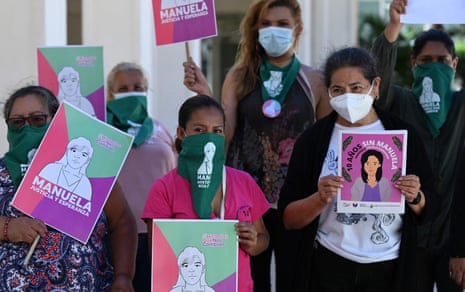The Inter-American court of human rights has ruled that El Salvador was responsible for the death of Manuela, a woman who was jailed in 2008 for killing her baby when she suffered a miscarriage.
The court has ordered the Central American country to reform its draconian policies on reproductive health.
The decision on Tuesday marked the first time an international court has ruled on El Salvador’s extreme abortion laws and was celebrated by women’s rights activists, who believe it could open doors for change across the region.
Since 1998, abortion in El Salvador has been banned without exception, even in cases of rape and incest. Over the past two decades, more than 180 women have been jailed for murder for having an abortion after suffering obstetric emergencies, according to rights groups.
The case of Manuela v El Salvador was brought after the 33-year-old mother of two from the countryside died from cancer after receiving inadequate medical diagnosis and treatment, leaving her two children orphaned. She had been serving a 30-year prison sentence for aggravated homicide after a miscarriage.
When Manuela – whose full name has never been made public in El Salvador – went to the hospital after miscarrying, staff failed to provide her with timely treatment and instead subjected her to verbal abuse and accused her of having an abortion, according to the Center for Reproductive Rights. Manuela was handcuffed to her bed and denied access to a lawyer while police interrogated her.
“There is no doubt that Manuela suffered an obstetric emergency,” the landmark court ruling stated. “Such situations, as they are medical conditions, cannot lead to a criminal sanction.”
The court also ruled that the state must pay reparations to Manuela’s family, and should develop comprehensive sexual education policies and guarantee doctor-patient confidentiality.
“The Inter-American court has done justice by recognising Manuela was another victim of an unjust legal context that originates in the absolute prohibition of abortion,” said Morena Herrera, at the Feminist Collective for Local Development, one of the parties in the case supporting Manuela’s family.
“Manuela’s story is a sad one, but it represents a change and becomes a path of justice and hope for all women in Latin America and the Caribbean who are criminalised for obstetric events.”
Most countries in the region respect the Inter-American court’s jurisdiction, opening the door for sweeping change, activists said.
“This is a huge advance for reproductive rights, not only in El Salvador but across Latin America,” said Catalina Martínez Coral, regional director for Latin America and the Caribbean at the Center for Reproductive Rights, another party in the case. “This is a standard we can apply to the constitutions and states across the region.”
Martínez Coral added that while the ruling was to be celebrated, the issue of poverty affecting access to reproductive rights remained a challenge.
“There are over 180 cases of women in jail, or that have been jailed, over these issues,” said Martínez Coral, who also worked as a litigator on the case against the Salvadorean state.
“What that means is we’re dealing with a state that criminalises women and, above all, criminalises poor women in the most rural and impoverished areas,” she said.
